Rabbana La Tuakhizna Inna Sina Meaning, Arabic, And Benefits
Rabbana la tuakhizna is a Dua from Surah Al Baqara, verse 286. It is a Dua for repentance (tawbah).
Advertisements
Rabbana La Tuakhizna Inna Sina Translation
Rabbana La Tuakhizzna means Our Lord, do not impose blame upon us if we have forgotten or erred.
Rabbana La Tuakhizna Dua In Arabic
رَبَّنَا لَا تُؤَاخِذْنَآ إِن نَّسِينَآ أَوْ أَخْطَأْنَا
Transliteration
Rabbana laa tu’aakhiznaaa in naseenaaa aw akhtaanaa.
Advertisements
It also means
Our Lord, do not take us to task if we forget or make a mistake!
Rabbana La Tuakhizna Inna Sina Meaning
According to Tafsir Ibn Sa’adi, this ayah means: ‘Pardon our wrong actions if we forget and make a mistake or simply forget or simply make a mistake,’ as the Prophet SAW said,
Error and forgetfulness have been removed from my Community and from what they are forced to do,’ i.e. its being a wrong action in those cases.
- Related readings Rabbana Anzil Alaina Maa
- Rabbana La Taj’alna Fitnatan Lil Meaning

There is no disagreement that the wrong action is cancelled out. There is disagreement about the rulings connected to that action.
Advertisements
Does that cancellation of the action mean that the action has no legal consequences or does it still entail all its legal consequences?
There is disagreement about that, and the sound position is that it varies according to the circumstances. It is agreed that some consequences are not cancelled, like penalties, blood money and obligatory prayers, and others are agreed to be cancelled, like retaliation and speaking words which can be considered to be disbelief.
There is disagreement about a third category, like eating out of forgetfulness in Ramadan or breaking an oath out of forgetfulness.
Advertisements
The full verse is:
Allah does not charge a soul except [with that within] its capacity. It will have [the consequence of] what [good] it has gained, and it will bear [the consequence of] what [evil] it has earned. “Our Lord, do not impose blame upon us if we have forgotten or erred. Our Lord, and lay not upon us a burden like that which You laid upon those before us. Our Lord, and burden us not with that which we have no ability to bear. And pardon us; and forgive us; and have mercy upon us. You are our protector, so give us victory over the disbelieving people.”
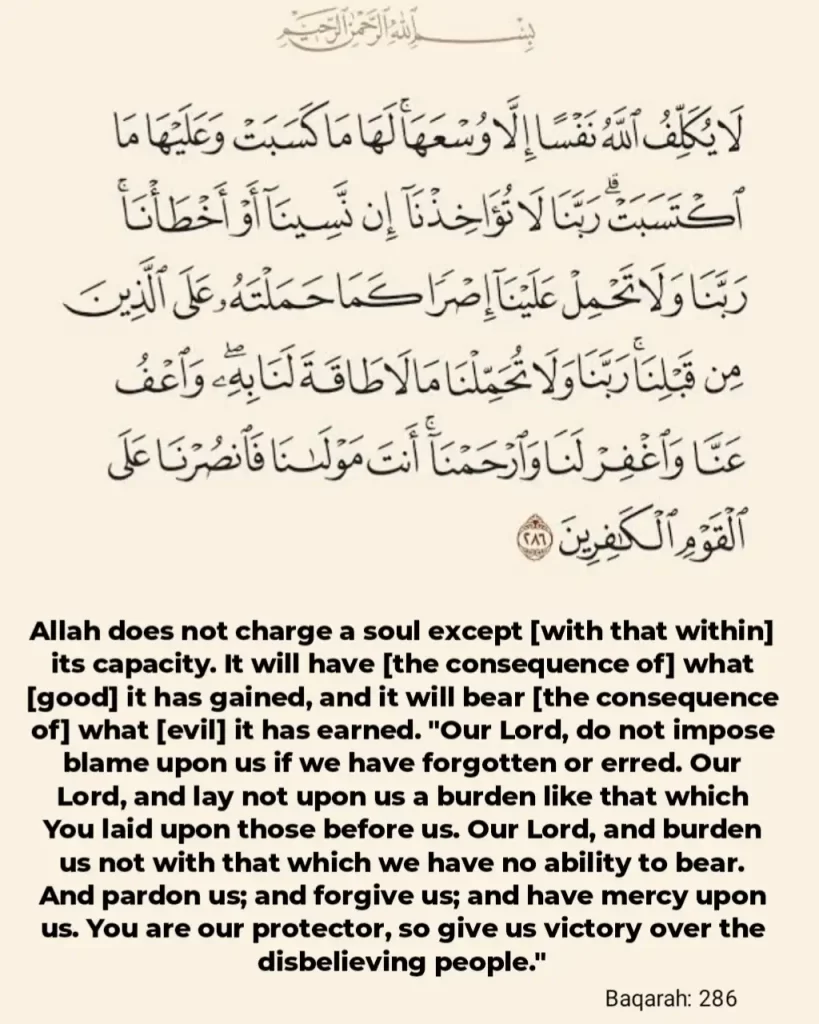
Commentary By Ibn Kathir
Allah burdens not a person beyond his scope, means, Allah does not ask a soul what is beyond its ability. This only demonstrates Allah’s kindness, compassion and generosity towards His creation.
This Ayah is the Ayah that abrogated the Ayah that worried the Companions, that is, Allah’s statement,
(And whether you disclose what is in yourselves or conceal it, Allah will call you to account for it), (2:284).
This indicates that although Allah will question His servants and judge them, He will only punish for what one is able to protect himself from.
As for what one cannot protect himself from, such as what one says to himself – or passing thoughts – they will not be punished for that.
We should state here that to dislike the evil thoughts that cross one’s mind is a part of faith.
Allah said next, He gets reward for that which he has earned, of good.
And he is punished for that which he has earned, of evil, that is, concerning the acts that one is responsible for.
Allah then said, (mentioning what the believers said) while directing His servants to supplicate to Him, all the while promising them that He will answer their supplication:
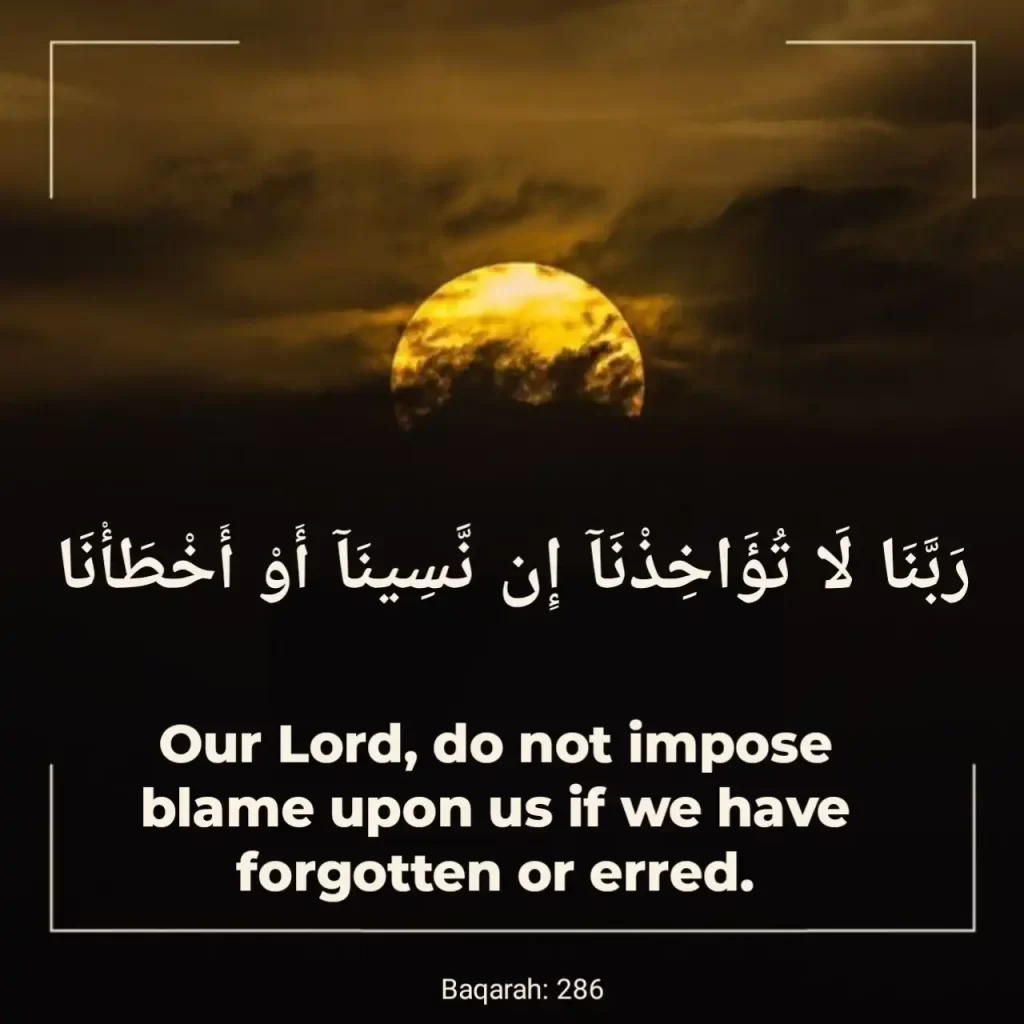
“Our Lord! Push us not if we forget or fall into error,” meaning, “If we forgot an obligation or fell into a prohibition, or made an error while ignorant of its ruling.”
We mentioned the Hadith by Abu Hurayrah, that Muslim collected, wherein Allah said, “I shall (accept your supplication).”
There is also the Hadith by Ibn Abbas that Allah said, “I did (accept your supplication).”
Our Lord! Lay not on us a burden like that which You did lay on those before us (Jews and Christians),
means, “Even if we were able to perform them, do not require us to perform the difficult deeds as You required the previous nations before us, such as the burdens that were placed on them.
You sent Your Prophet Muhammad, the Prophet of mercy, to abrogate these burdens through the Law that You revealed to him, the Hanifi (Islamic Monotheism), easy religion.”
Muslim recorded that Abu Hurayrah said that; the Messenger of Allah said that Allah said, “I shall (accept your supplication).”
Ibn Abbas narrated that the Messenger of Allah said that Allah said, “I did (accept your supplication).”
There is the Hadith recorded through various chains of narration that; the Messenger of Allah said,
I was sent with the easy Hanifiyyah way.
Our Lord! Put not on us a burden greater than we have strength to bear, of obligations, hardships and afflictions, do not make us bear what we cannot bear of this.
(Our Lord! Put not on us a burden greater than we have strength to bear), We mentioned that Allah said,
“I shall (accept your supplication)” in one narration, and, “I did (accept your supplication),” in another narration.
Pardon us, meaning, between us and You regarding what You know of our shortcomings and errors.
And grant us forgiveness, concerning what is between us and Your servants. So do not expose our errors and evil deeds to them.
Have mercy on us, in what will come thereafter. Therefore, do not allow us to fall into another error.
They say that those who commit error need three things:
Allah’s forgiveness for what is between Him and them, that He conceals these errors from His other servants, and thus does not expose them before the servants, and that He grants them immunity from further error.”
We mentioned before that Allah answered these pleas, “I shall,” in one narration and, “I did,” in another narration.
You are our Mawla, meaning, You are our supporter and helper, our trust is in You, You are sought for each and every type of help and our total reliance is on You. There is no power or strength except from You.
And give us victory over the disbelieving people. Those who rejected Your religion, denied Your Oneness, refused the Message of Your Prophet, worshipped other than You and associated others in Your worship.
Give us victory and make us prevail above them in this and the Hereafter.
Allah said, “I shall,” in one narration, and, “I did,” in the Hadith that Muslim collected from Ibn Abbas.
Further, Ibn Jarir recorded that Abu Ishaq said that; whenever Mu`adh would finish reciting this Surah,
(And give us victory over the disbelieving people), he would say “Amin.”
Benefits
- This is a supplication for tawbah (repentance).
- Asking for the forgiveness of Allah (swt) is the best kind of prayer you can make.
- It shows humility in your character, protects you from boasting or growing prideful.
- Constant repentance is a characteristic that shows your complete reliance on Allah for all things and can open the door of rizq (provision) for you.
Advertisements

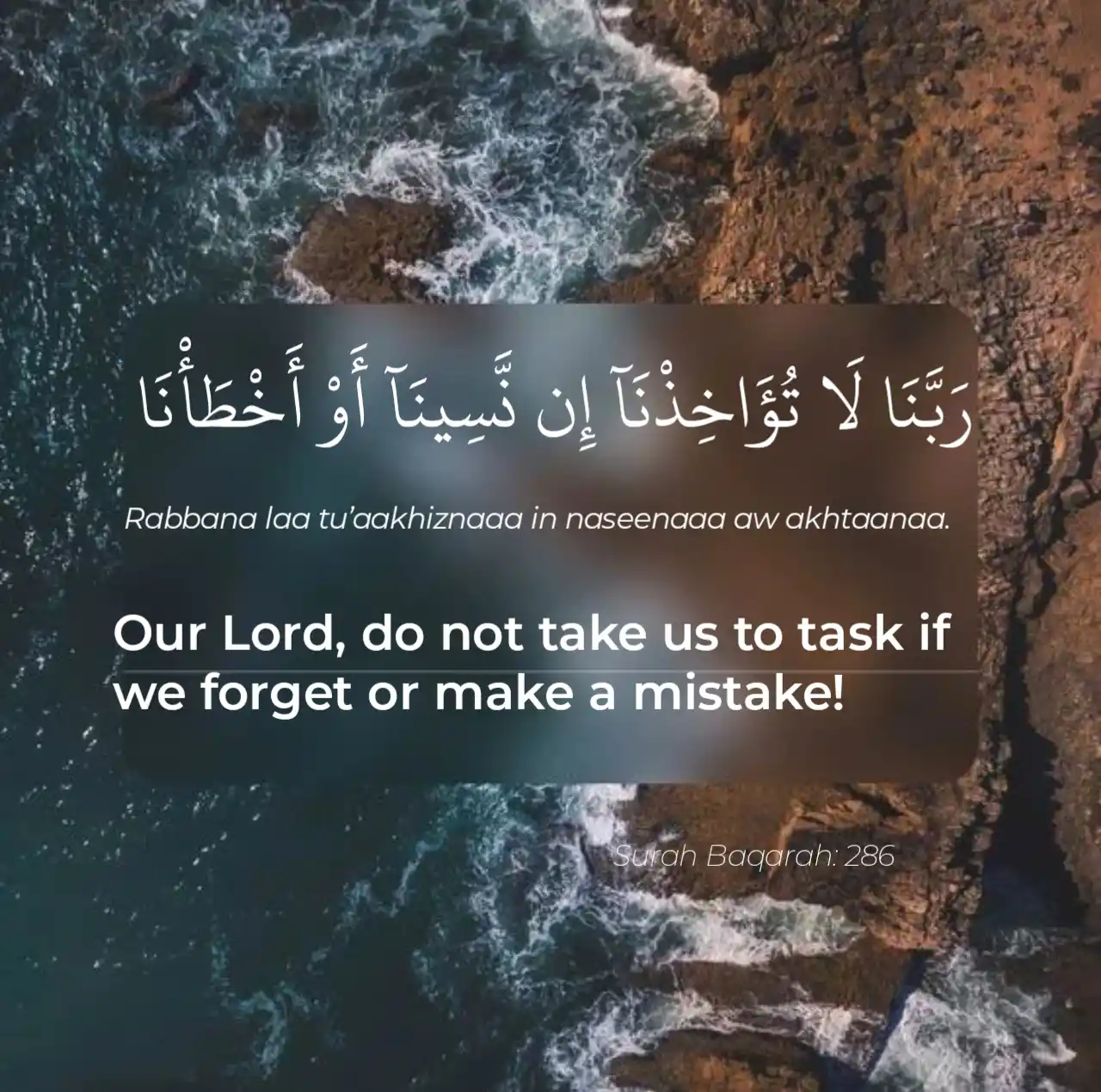



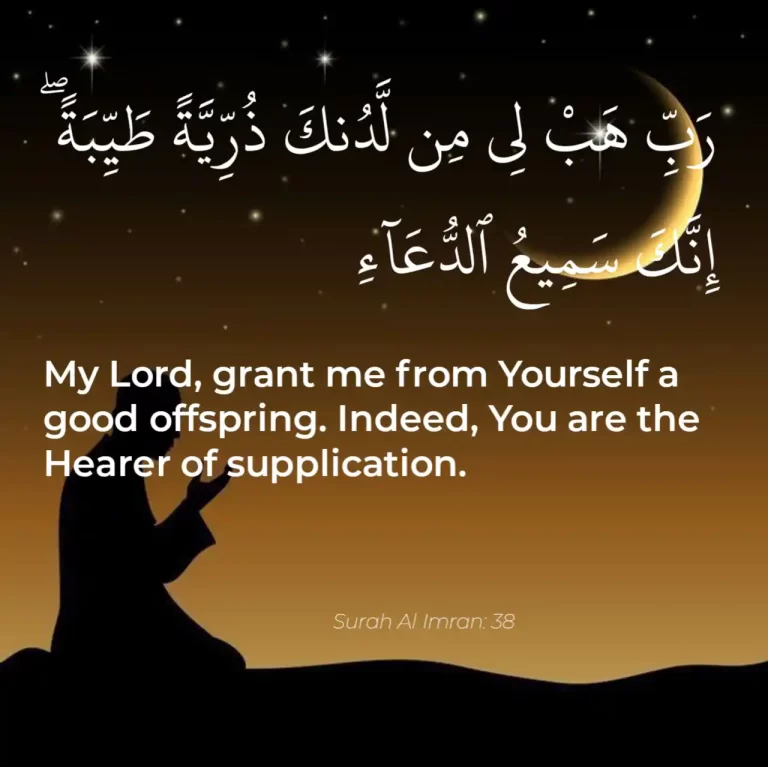
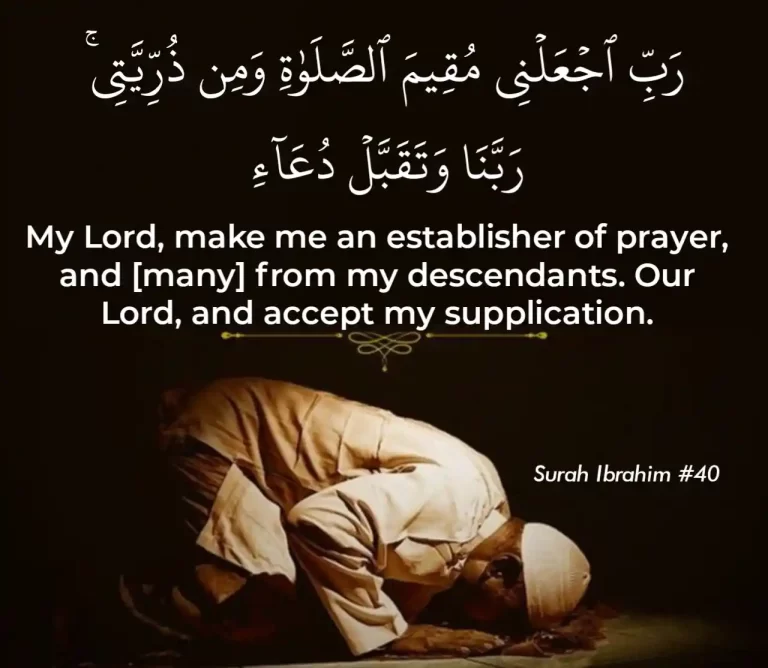

3 Comments